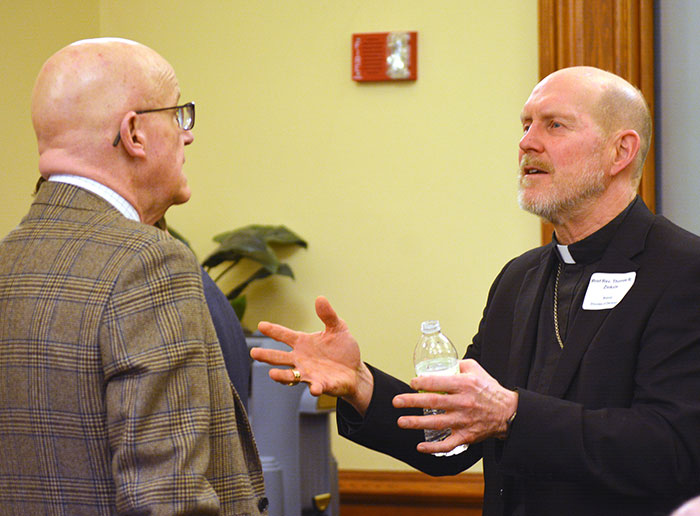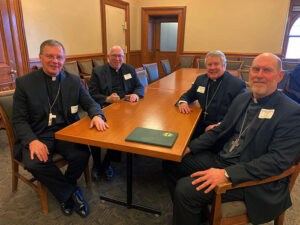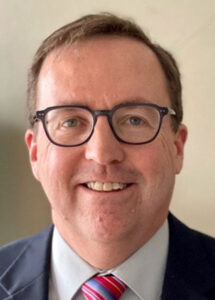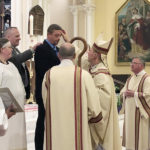
Bishop Thomas Zinkula speaks with Iowa State Representative Ken Croken of Davenport after the Iowa Bishops’ Legislative Breakfast held Jan. 24 at the State Capitol in Des Moines.
By Barb Arland-Fye
The Catholic Messenger
DES MOINES — Over eggs, doughnuts, coffee and juice, Iowa’s bishops hosted their annual forum with Iowa legislators last week for informal discussions about issues of interest and concern to their Catholic constituents. The Iowa Catholic Conference, the public policy voice of Iowa’s bishops, organizes the annual event.
The breakfast on Jan. 24 coincidentally took place the day that Gov. Kim Reynolds signed into law the “Students First Act,” which will give more families the opportunity to choose between sending their children to private or public schools. The bill is also known by its acronym, ESA (Education Savings Account).
A bill-signing ceremony pre-empted the governor’s formal meeting with Archbishop Michael Jackels of the Dubuque Archdiocese, Bishop Thomas Zinkula of the Davenport Diocese, Bishop R. Walker Nickless of the Sioux City Diocese, and Bishop William Joensen of the Des Moines Diocese.
“So Gov. Reynolds attended the breakfast instead,” Bishop Zinkula said. “She was very happy about the passage of the bill. That was the topic of conversations with the people present at the breakfast. Lots of people were congratulating her.”
Around 30 legislators stopped by over the course of the two-hour gathering at the State Capitol, said Tom Chapman, executive director of the Iowa Catholic Conference (ICC). He thought attendance was down because of the long night preceding the breakfast, when legislators completed passage of the ESA bill. “We thanked them for their efforts to pass the bill,” Bishop Zinkula

From left, Bishop William Joensen of the Diocese of Des Moines, Archbishop Michael Jackels of the Archdiocese of Dubuque, Bishop R. Walker Nickless of the Diocese of Sioux City and Bishop Thomas Zinkula of the Diocese of Davenport take a break from the Iowa legislative breakfast to talk with one another Jan. 24 in Des Moines.
said. The bishops had an opportunity to talk about several other topics with legislative leaders during meetings after the breakfast:
• The Iowa MOMS program, which provides funding for pregnancy counseling centers, etc.
• Bills moving in both chambers on probation reform, which would lessen the time of probation for those who are pursuing education or are actively employed.
• A bill in the House that would make it more difficult for people to receive SNAP (food stamp) benefits.
• A bill in the House to provide state funds to nonprofit organizations that help refugees.
• A House bill that would require public schools to be transparent with parents regarding gender identity issues of students.
Deacon Kent Ferris, who chairs the ICC Human Life and Dignity Committee, attended the breakfast along with several other leaders from the Iowa dioceses. “My sense was that the Students First Act had taken a lot of time and energy. Those who did attend the breakfast arrived mostly in the second hour. Many of the conversations related to the bill.”
Deacon Ferris said House File 3, regarding potential changes to eligibility for SNAP and Medicaid “was not on the front burner the morning of the breakfast but it is an area of concern to folks in our local communities.” The ICC opposes the bill and is monitoring it, Chapman said. “The main issue as we see it is putting a new asset test in place that would put Iowans with more than one vehicle at risk of losing access to SNAP benefits. The bill would also create additional administrative steps for Iowans to fulfill before they could qualify for benefits,” he said. “To give some further context, the number of Iowans currently enrolled in food stamps is at a 14-year low of 135,267 households.”
Deacon Ferris expresses gratitude to the bishops for taking the time to thank those who have made the commitment to serve their constituent neighbors and for modeling the importance of faithful citizenship. “They are demonstrating that active citizenship requires ongoing communication with those in public office and is not merely a civic duty to be undertaken on the first Tuesday of November every four years.”
He also appreciates when representatives offer to meet with constituent parishioners back in their districts, even parish groups. “Those types of conversations, as with contact regarding certain pieces of legislation of interest, are reasonable and appropriate. They are not partisan in nature as when folks are operating within a political campaign for office.”
Chapman said, “I think it’s beneficial for the bishops to have discussions with legislators to hear what they’re interested in directly. It’s helpful for me for the bishops to talk with legislators

so the members know I directly represent the bishops.”











